VA Claims for Exposure to AFFF: Steps to File a Claim
- Last Updated: July 14th, 2025

Attorney Jessica Paluch-Hoerman, founder of TruLaw, has over 28 years of experience as a personal injury and mass tort attorney, and previously worked as an international tax attorney at Deloitte. Jessie collaborates with attorneys nationwide — enabling her to share reliable, up-to-date legal information with our readers.
Legally Reviewed
This article has been written and reviewed for legal accuracy and clarity by the team of writers and legal experts at TruLaw and is as accurate as possible. This content should not be taken as legal advice from an attorney. If you would like to learn more about our owner and experienced injury lawyer, Jessie Paluch, you can do so here.
Fact-Checked
TruLaw does everything possible to make sure the information in this article is up to date and accurate. If you need specific legal advice about your case, contact us by using the chat on the bottom of this page. This article should not be taken as advice from an attorney.
Key takeaways:
- Veterans who were exposed to AFFF during military service and developed health issues as a result may be eligible for VA disability compensation by filing a claim supported by evidence of exposure and medical records.
- The VA claims process for AFFF exposure can be complex, requiring veterans to gather extensive documentation, service records, and medical evidence to establish a service connection and meet the VA's high evidentiary standards.
- Working with a VA-accredited attorney experienced in AFFF litigation can help veterans navigate the claims process, advocate for their rights, and secure the compensation and benefits they deserve for their service-connected health conditions.
Overview of VA Claims for Exposure to AFFF
On this page, we’ll discuss VA Claims for Exposure to AFFF, how to file a successful VA claim for AFFF-related health issues, the evidence needed to file a VA Claim for AFFF Exposure, and much more.
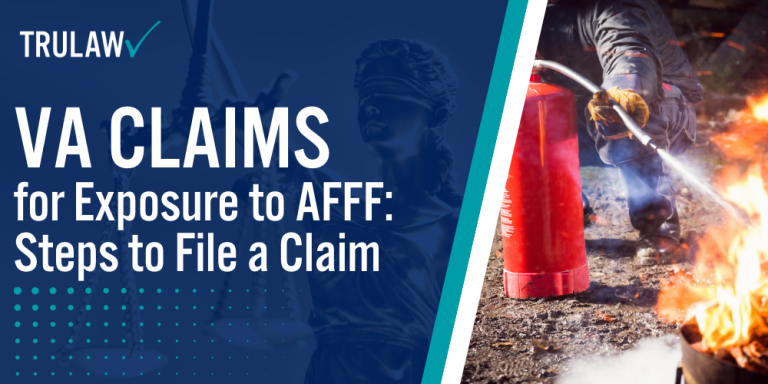
Intro to VA Claims for Exposure to AFFF
Filing a VA claim for AFFF exposure involves several key steps, including:
- Gathering Evidence: Collect medical records, service records, and any other documentation that supports your exposure to AFFF during military service.
- Establishing Service Connection: You must demonstrate that your health issues are directly related to your AFFF exposure while serving in the military.
- Submitting Your Claim: File your claim with the VA, ensuring all required documentation is included.
- Appealing Denied Claims: If your initial claim is denied, you have the right to appeal the decision and provide additional evidence to support your case.
If you’re a veteran who has been diagnosed with health problems related to AFFF exposure during your military service, you may be entitled to VA benefits and compensation.
Contact TruLaw today by using the chat feature on this page for a free consultation to learn more about your legal options and how to file a successful VA claim.
Table of Contents
Eligibility Criteria For VA Claims Related To AFFF Exposure
Veterans seeking VA disability claims for conditions related to AFFF (Aqueous Film Forming Foam) exposure must meet specific eligibility criteria.
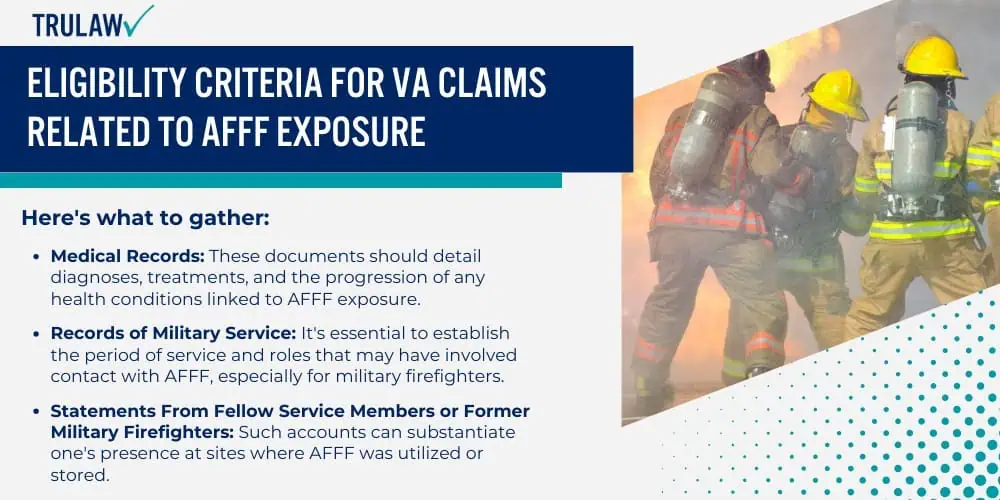
These criteria involve proving a service connection and documented evidence of exposure and health effects.
Gathering Evidence To Support Your VA Claim
Veterans asserting claims related to AFFF exposure need a comprehensive collection of evidence.
Here’s what to gather:
- Medical Records: These documents should detail diagnoses, treatments, and the progression of any health conditions linked to AFFF exposure.
- Records of Military Service: It’s essential to establish the period of service and roles that may have involved contact with AFFF, especially for military firefighters.
- Statements From Fellow Service Members or Former Military Firefighters: Such accounts can substantiate one’s presence at sites where AFFF was utilized or stored.
- Documentation Demonstrating the Link between AFFF Exposure and the Present Medical Condition (Service Connection): This scientific or competent medical evidence can help establish a direct relationship between exposure to AFFF during military service and current health issues.
Veterans are responsible for providing evidence that their exposure is associated with their time in service.
Veterans Affairs (VA) reviews this information critically to determine the validity of a VA disability claim.
Filing Your VA Claim For AFFF Exposure
Veterans affected and seeking disability benefits for health issues related to AFFF (Aqueous Film Forming Foam) exposure during military service can file a claim through the Veterans Affairs (VA) system.
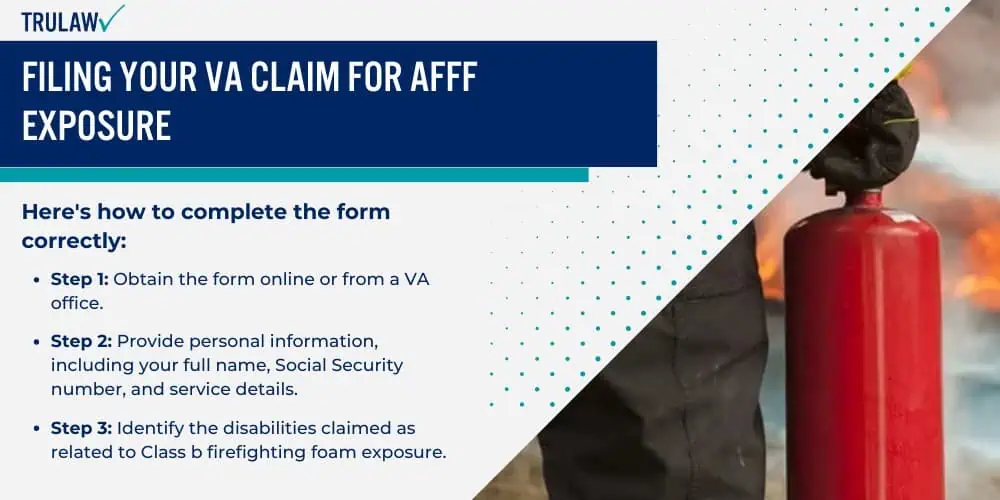
The process involves submitting a specific VA form and the necessary evidence to support the claim.
Completing VA Form 21-526EZ For Disability Compensation
VA Form 21-526EZ is the starting point for filing a claim for disability compensation.
Here’s how to complete the form correctly:
- Step 1: Obtain the form online or from a VA office.
- Step 2: Provide personal information, including your full name, Social Security number, and service details.
- Step 3: Identify the disabilities claimed as related to Class b firefighting foam exposure.
- Step 4: List any additional benefits or relevant information that supports the claim, including special circumstances.
- Step 5: Review and verify that all information is accurate before submission.
- Step 6: Sign and date the form, affirming the claim’s truthfulness.
Submitting Supporting Evidence And Documentation
Support is essential when filing a VA claim.
The VA claims process requires tangible evidence to link AFFF exposure to the disability claimed:
- Compile medical records demonstrating diagnoses or treatment for illnesses caused by AFFF exposure.
- Include statements from medical professionals supporting a claim for a service-related health condition.
- Gather any service records that confirm AFFF use or training during your military service.
- Provide witness testimonies from fellow service members corroborating your AFFF exposure.
- Confirm that all the information in your evidence is current and represents your health status accurately.
- Ensure all documentation is organized and submitted as prescribed by the VA.
Veterans may also seek assistance from accredited representatives or VA-certified attorneys who can provide guidance and help ensure that all necessary documentation is collected and presented effectively.
This guidance can increase the likelihood of a successful result in the VA compensation system for disabilities related to AFFF firefighting foam exposure.
The VA Claims Process For AFFF Exposure Cases
The Veterans Affairs (VA) claims process for AFFF (Aqueous Film Forming Foam) exposure involves meticulous review and can lead to compensatory benefits for veterans with service-connected health issues.
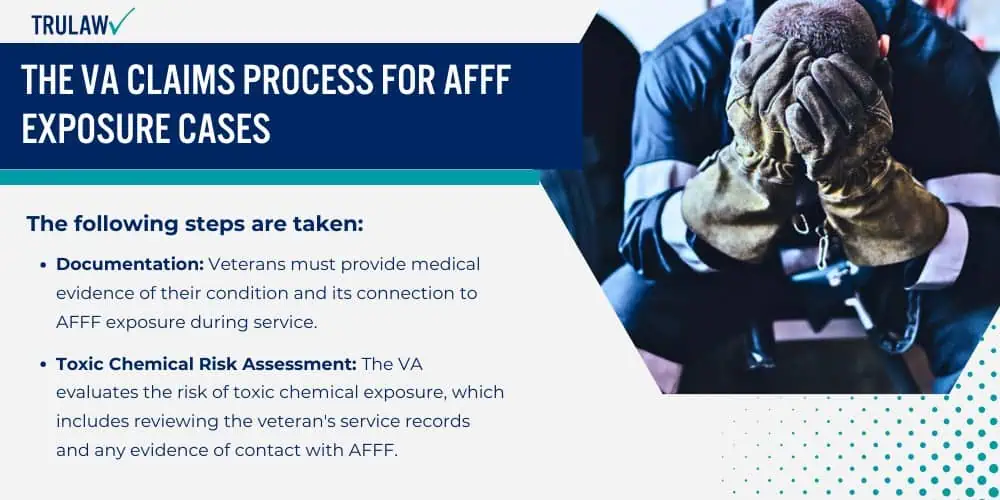
Initial Review And Rating Decision By The VA
When a veteran submits a claim for AFFF exposure, the VA begins with an initial review to determine whether service-connected conditions exist.
The following steps are taken:
- Documentation: Veterans must provide medical evidence of their condition and its connection to AFFF exposure during service.
- Toxic Chemical Risk Assessment: The VA evaluates the risk of toxic chemical exposure, which includes reviewing the veteran’s service records and any evidence of contact with AFFF.
- C&P Exam: If more information is needed, a Compensation & Pension (C&P) examination may be requested to assess the severity and relation to military service.
- VA Disability Ratings: Based on all gathered evidence, the VA assigns a disability rating directly affecting the extent of VA benefits provided.
Appealing A Denied VA Claim For AFFF Exposure
Veterans can appeal a VA decision denying a claim for AFFF exposure.
The steps below outline the appeal process:
- Notice of Disagreement (NOD): Veterans should file this document to start the appeal, disagreeing with the VA’s decision.
- Evidence Submission: Additional medical evidence or service records may be submitted to support the claim.
- Review Process: A senior VA official reviews the original decision and new evidence.
- Legal Process: If the claim is denied again, the veteran can further appeal to the Board of Veterans’ Appeals and, if necessary, to external courts.
Throughout this process, veterans can utilize legal representation to navigate the procedural aspects and to advocate for their right to receive VA benefits for service-connected health issues related to AFFF exposure.
Seeking Legal Assistance For Your VA Claim
Having the right legal support can be pivotal when veterans submit a VA claim for health issues related to AFFF (aqueous film-forming foam).
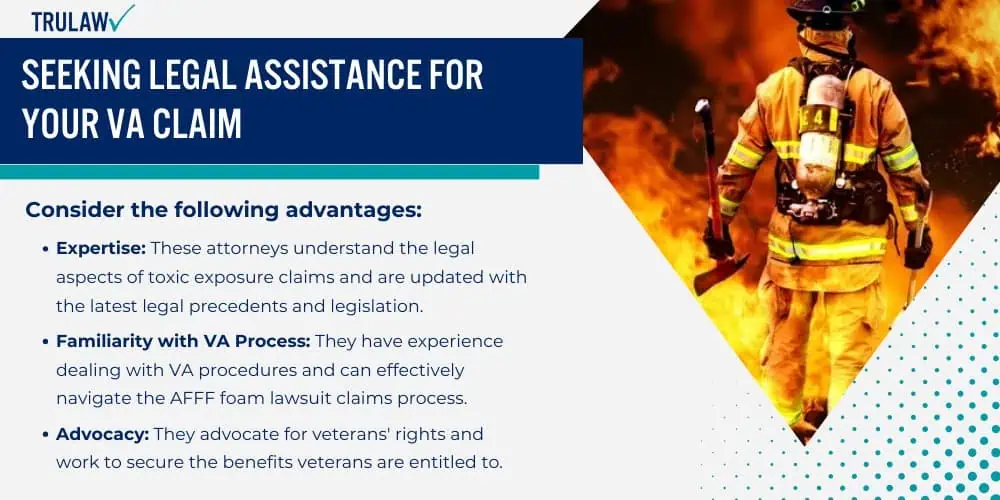
Legal professionals with experience in AFFF litigation can guide claimants through the often complex VA claims process.
Benefits Of Working With A VA-Accredited Attorney
VA-accredited attorneys are key allies for veterans seeking compensation.
They are familiar with the laws and regulations about VA claims and AFFF lawsuits, which can significantly improve the viability of a veteran’s claim.
Consider the following advantages:
- Expertise: These attorneys understand the legal aspects of toxic exposure claims and are updated with the latest legal precedents and legislation.
- Familiarity with VA Process: They have experience dealing with VA procedures and can effectively navigate the AFFF foam lawsuit claims process.
- Advocacy: They advocate for veterans’ rights and work to secure the benefits veterans are entitled to.
- No Upfront Costs: Veterans can often retain a VA-accredited attorney without upfront fees; attorneys are paid a percentage of the benefits they help recover.
Choosing The Right Legal Representative For Your Case
Selecting an appropriate legal representative requires research and consideration to ensure they are a suitable match for a veteran’s specific situation in an AFFF lawsuit.
To make an informed decision, consider these important factors:
- Experience: Look for a law firm with a successful track record with AFFF cases and VA claims.
- Communication: Choose an attorney who communicates clearly and keeps clients informed.
- Resources: Ensure the firm has sufficient resources to investigate and support your claim thoroughly.
- Client Feedback: Read previous client testimonials to gauge the quality of the legal assistance provided.
Compensation And Benefits For Successful VA Claims
When Veterans Affairs approves a claim for exposure to Aqueous Film Forming Foam (AFFF), veterans may receive compensation and multiple benefits based on their health conditions and disability percentage.
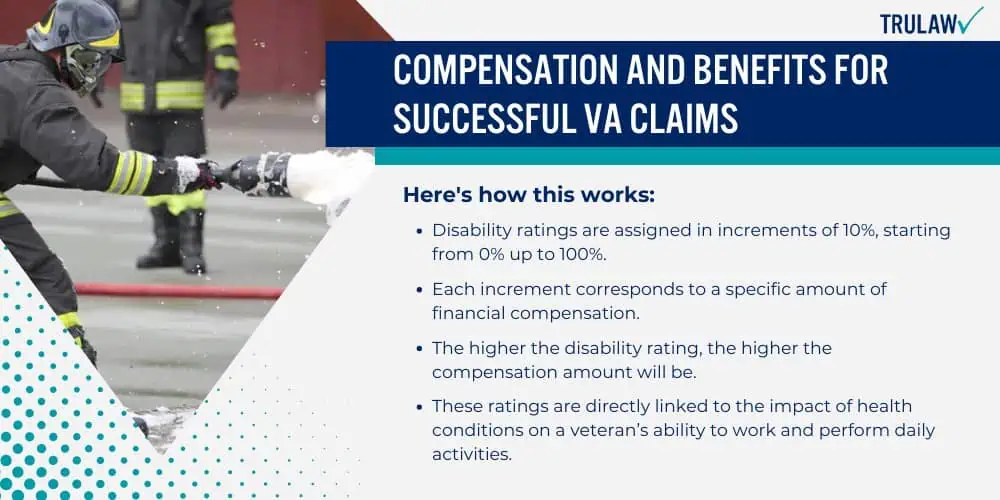
Disability Ratings And Monthly Compensation Amounts
The VA determines monthly compensation benefits by a veteran’s disability rating, which reflects the severity of their condition.
Here’s how this works:
- Disability ratings are assigned in increments of 10%, starting from 0% up to 100%.
- Each increment corresponds to a specific amount of financial compensation.
- The higher the disability rating, the higher the compensation amount will be.
- These ratings are directly linked to the impact of health conditions on a veteran’s ability to work and perform daily activities.
VA recognizes the following monthly compensation ranges as of the current schedule:
- For a 10% disability rating, the amount is relatively low, reflecting minor impairment.
- As ratings increase to 30%, the veteran may additionally receive compensation for dependents.
- A 100% disability rating yields the maximum compensation, reflecting total impairment due to health issues.
Additional VA Benefits For AFFF-Related Health Issues
Veterans who have been exposed to AFFF (aqueous film-forming foam) and experience related health issues may be entitled to various benefits through the VA.
These benefits can include disability compensation, financial assistance for dependent family members, and educational opportunities for retraining or skill development.
Veterans who succeed in their VA claims for AFFF exposure might also be eligible for other benefits:
- Health care services, including medical treatments for AFFF-related conditions.
- Access to various support programs designed to help with rehabilitation.
- Vocational training and employment services to assist veterans who face job-related difficulties due to their health.
- In certain cases, eligibility for grants such as the Specially Adapted Housing (SAH) or Special Home Adaptation (SHA) grant, helps veterans with permanent and total service-connected disabilities.
A thorough understanding of available compensation and benefits can significantly aid veterans adjusting post-service.
The VA continually updates its policies, so veterans should ensure they have the most current information.
Challenges In Proving VA Claims For AFFf Exposure
Veterans filing claims for health problems due to AFFF exposure face significant hurdles.
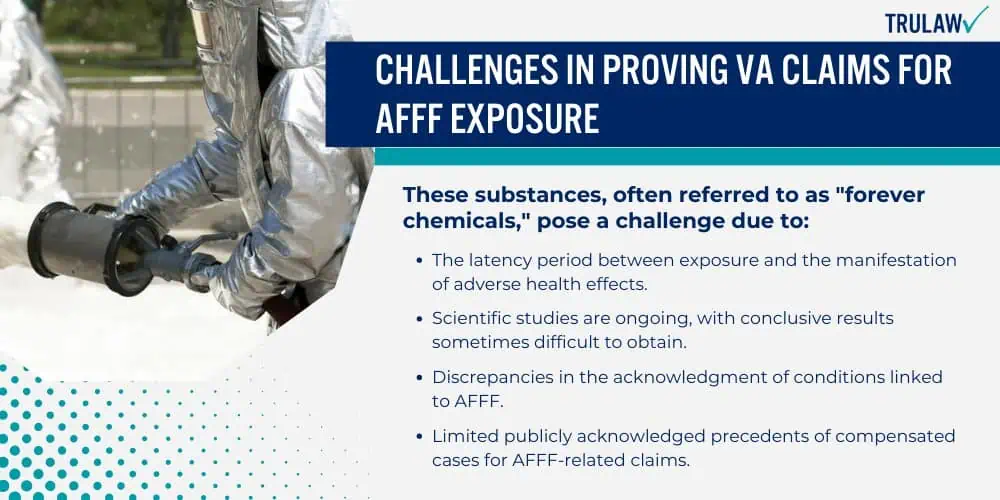
The nature of toxic chemicals and establishing a direct link to service can be daunting.
Limited Scientific Evidence Linking AFFf To Certain Conditions
Toxic exposure to AFFF, or aqueous film-forming foam containing PFAS (perfluoroalkyl and polyfluoroalkyl substances), has been used extensively by the military, especially by Air Force firefighters.
Air Force firefighter diagnosed with multiple myeloma in 2019, attributed to frequent AFFF exposure.
These substances, often referred to as “forever chemicals,” pose a challenge due to:
- The latency period between exposure and the manifestation of adverse health effects.
- Scientific studies are ongoing, with conclusive results sometimes difficult to obtain.
- Discrepancies in the acknowledgment of conditions linked to AFFF.
- Limited publicly acknowledged precedents of compensated cases for AFFF-related claims.
Establishing a service connection for potential health risks with limited scientific backing can be an uphill battle.
Overcoming VA’s High Evidentiary Standards
Veterans must navigate through the VA’s evidentiary requirements to prove their claims for health problems linked to PFAS exposure.
The Environmental Protection Agency (EPA) has raised awareness of the impact of PFAS-contaminated drinking water on communities.
Key obstacles include:
- Gathering credible medical evidence to support that the health risks are indeed service-connected.
- The VA requires a high standard of proof, including detailed service records and medical diagnoses.
- Unlike other toxic exposures, there is a lack of a presumptive list of conditions caused by PFAS.
- Demonstrating a clear nexus between toxic chemicals in AFFF and specific health problems veterans face.
This process underscores the importance of thorough documentation and expert medical opinion in establishing a valid VA claim.
AFFF Lawsuit Frequently Asked Questions
-
Symptoms related to AFFF (Aqueous Film Forming Foam) exposure in veterans may include respiratory issues, skin rashes, and other health concerns that mirror toxic exposure.
If a veteran is experiencing unusual health problems and has a history of AFFF, they should consult their healthcare provider.
-
Several medical conditions are linked to AFFF exposure, though the full list is continually updated as more research becomes available.
Current presumptions include certain cancers and other long-term health conditions, best confirmed by checking the latest VA guidelines or speaking with a veterans’ advocate.
-
Veterans may file for VA compensation by submitting a claim through the VA’s official website or with the assistance of an accredited representative.
They must provide evidence of service connection and current medical diagnosis related to AFFF exposure.
-
To obtain a VA disability rating for PFAS exposure, veterans must provide medical evidence of their condition and its connection to military service.
The VA evaluates the severity of the condition and its impact on the veteran’s quality of life, assigning a percentage rating that determines compensation.
-
The Honoring Our PACT Act is a significant legislation that acknowledges the health risks of toxic exposures, including PFAS, for military personnel.
This act is a groundbreaking step towards ensuring affected veterans receive the healthcare and benefits they deserve.
-
To support a claim, veterans should provide military service records indicating AFFF exposure and relevant medical records.
They should also collect pertinent scientific studies that could strengthen the link between their health conditions and AFFF exposure for the VA claim.

Managing Attorney & Owner
With over 25 years of legal experience, Jessica Paluch-Hoerman is an Illinois lawyer, a CPA, and a mother of three. She spent the first decade of her career working as an international tax attorney at Deloitte.
In 2009, Jessie co-founded her own law firm with her husband – which has scaled to over 30 employees since its conception.
In 2016, Jessie founded TruLaw, which allows her to collaborate with attorneys and legal experts across the United States on a daily basis. This hypervaluable network of experts is what enables her to share the most reliable, accurate, and up-to-date legal information with our readers!
Additional AFFF Lawsuit resources on our website:
Here, at TruLaw, we’re committed to helping victims get the justice they deserve.
Alongside our partner law firms, we have successfully collected over $3 Billion in verdicts and settlements on behalf of injured individuals.
Would you like our help?
At TruLaw, we fiercely combat corporations that endanger individuals’ well-being. If you’ve suffered injuries and believe these well-funded entities should be held accountable, we’re here for you.
With TruLaw, you gain access to successful and seasoned lawyers who maximize your chances of success. Our lawyers invest in you—they do not receive a dime until your lawsuit reaches a successful resolution!
AFFF Lawsuit claims are being filed against manufacturers of aqueous film-forming foam (AFFF), commonly used in firefighting.
Claims allege that companies such as 3M, DuPont, and Tyco Fire Products failed to adequately warn users about the potential dangers of AFFF exposure — including increased risks of various cancers and diseases.
Depo Provera Lawsuit claims are being filed by individuals who allege they developed meningioma (a type of brain tumor) after receiving Depo-Provera birth control injections.
A 2024 study found that women using Depo-Provera for at least 1 year are five times more likely to develop meningioma brain tumors compared to those not using the drug.
Suboxone Tooth Decay Lawsuit claims are being filed against Indivior, the manufacturer of Suboxone, a medication used to treat opioid addiction.
Claims allege that Indivior failed to adequately warn users about the potential dangers of severe tooth decay and dental injuries associated with Suboxone’s sublingual film version.
Social Media Harm Lawsuits are being filed against social media companies for allegedly causing mental health issues in children and teens.
Claims allege that companies like Meta, Google, ByteDance, and Snap designed addictive platforms that led to anxiety, depression, and other mental health issues without adequately warning users or parents.
Transvaginal Mesh Lawsuits are being filed against manufacturers of transvaginal mesh products used to treat pelvic organ prolapse (POP) and stress urinary incontinence (SUI).
Claims allege that companies like Ethicon, C.R. Bard, and Boston Scientific failed to adequately warn about potential dangers — including erosion, pain, and infection.
Bair Hugger Warming Blanket Lawsuits involve claims against 3M — alleging their surgical warming blankets caused severe infections and complications (particularly in hip and knee replacement surgeries).
Plaintiffs claim 3M failed to warn about potential risks — despite knowing about increased risk of deep joint infections since 2011.
Baby Formula NEC Lawsuit claims are being filed against manufacturers of cow’s milk-based baby formula products.
Claims allege that companies like Abbott Laboratories (Similac) and Mead Johnson & Company (Enfamil) failed to warn about the increased risk of necrotizing enterocolitis (NEC) in premature infants.
Here, at TruLaw, we’re committed to helping victims get the justice they deserve.
Alongside our partner law firms, we have successfully collected over $3 Billion in verdicts and settlements on behalf of injured individuals.
Would you like our help?
